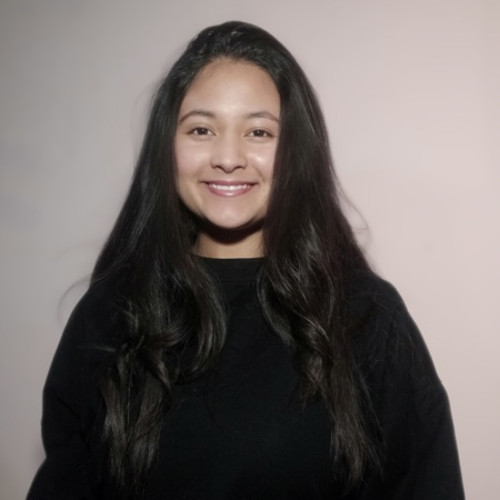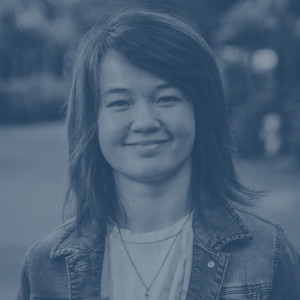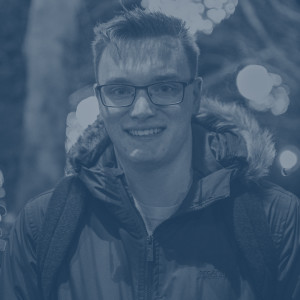Rashika Karki, 21

Rashika comes from a technical background, as her mother works in engineering. When Rashika was younger she used to frequently visit her mom’s office, where she found hanging out in the lab fascinating. Spending time in that space with her mother planted the seed in her mind that she wanted to pursue technology. At the time, she was really into video games and had an idea of becoming a game developer. At the age of 15, she started to learn game development, teaching herself skills through many online tutorials and finding help from her mother's colleague, who became a sort of mentor. In the process of building games, she realized that she didn’t like working on animations but actually loved the logical aspects of coding, an epiphany that helped her realize her passion for computing.
As Rashika went on to study computer engineering at university, she went from classrooms with equal gender representation to being one of only seven girls in her lecture hall. Gendered stereotypes were a serious challenge for Rashika, as she felt constantly reminded that tech was a field for men, which initially made her feel uncomfortable about pursuing technology. On top of that, the gaps in technical knowledge and enthusiasm that the boys had over the girls made her feel extremely overwhelmed and like an imposter that did not belong there. Male friends in the class were supportive in helping her adjust to the setting, but the hacker community played a huge role in helping her get past those limiting beliefs from the moment she walked into her first event.
One of Rashika's friends invited her to be a member on their team at a hackathon, and despite not knowing much about hackathons at the time, she liked the idea of building a project from the ground up in a short amount of time. She was hesitant to sign up and unsure of if she would fit in at the event, but she ended up so glad that she took up her friend’s offer. She attended Yomari Hackathon Fall 2017 as a relative beginner to programming, but in a short amount of time, she was able to get so many things done and contribute to her team’s project that she felt, for the first time, confident in her technical skills. The hacker community is the most inclusive and welcoming community she has ever been a part of which gave her a platform to discover and learn new things. Every hackathon since has helped strengthen her “I can” attitude, and without the support of the hacker community and hackathons’ learning environment, Rashika would not be where she is today. She knows that there are a lot of women out in the tech field who are in the same place that she was, and she hopes that her story will inspire and motivate them to take the jump and challenge existing stereotypes by breaking into the world of technology and innovation.
Hackathons became a place for Rashika to try out new things and brush up on her skills. Every hack she built made her feel more confident about her technical abilities, which she had previously really struggled with, and everyone she has met and networked with taught her a lot and became valuable and meaningful parts of her social web. Attending hackathons inspired Rashika to help organize several local hackathons, including acting as head of operations for KU Hackfest, Nepal’s first virtual MLH hackathon. The event was inspired by a desire to establish a culture of remote hackathons in Nepal, as many annual in-person events were getting canceled due to COVID-19. Rashika and her team were excited to host a virtual event as they would be able to reach more people outside the university from surrounding communities to make the event more inclusive, but they were also nervous about how to ensure hackers would have the best hackathon experience possible in a virtual format. The planning process involved a lot of meetings with MLH team members and hackathon organizers, especially with Harshil Agrawal, to develop ideas on how to host the virtual hackathon. Based on many suggestions, Rashika's team was able to change much of the hackathon's structure for the virtual event, such as organizing different events to keep hackers busy and let them meet other attendees, making virtual team building events to help hackers network, and the tricky task of using discord bots to try and streamline the process of connecting hackers to form teams. The hard work paid off as the event was a grand success, with over 700 attendees and a ton of positive feedback on their efforts to make the virtual event feel just as inviting and as positive a space as an in-person event. Organizing has taught Rashika leadership and professional skills that will remain valuable for the rest of her life.
Rashika had always wanted to get into the world of open source because she loved the idea of collaboratively building projects that add value to the world, but she struggled to get her foot in the door. She found the large codebases of open-source projects intimidating and had no idea where to start. In the process of looking for resources online to get started with open-source contributions, Rashika learned about the MLH Fellowship program. Spending a summer immersing in and contributing to open-source projects was an exciting prospect and exactly what she was looking for, so she applied and was luckily accepted! Rashika created her favorite project at the MLH Fellowship’s orientation hackathon, CodeVid Live, a mobile application that lets users estimate the probability of coronavirus contamination if they stay in a particular area. Before the Fellowship she would usually stick with the same team and work with her go-to tech stack, but collaborating on CodeVid Live with people outside of her time zone while using an unfamiliar tech stack got her comfortable collaborating with people she had not worked with before, and she came out of the orientation feeling confident to try new things and discover new technologies. That summer was an amazing learning experience, and despite a difficult start with open source, her amazing mentor and pod mates helped her make a number of contributions in open-source projects and connect with many amazing Fellows. After the Fellowship, Rashika returned to MLH as a pod leader where she helped other Fellows have the same amazing experience that she did. The entire journey from being a Fellow to a pod leader was super fun and informative for her and helped her get the skills she needed to break into open source development.
Quick Facts
Rashika Karki, 21

Rashika comes from a technical background, as her mother works in engineering. When Rashika was younger she used to frequently visit her mom’s office, where she found hanging out in the lab fascinating. Spending time in that space with her mother planted the seed in her mind that she wanted to pursue technology. At the time, she was really into video games and had an idea of becoming a game developer. At the age of 15, she started to learn game development, teaching herself skills through many online tutorials and finding help from her mother's colleague, who became a sort of mentor. In the process of building games, she realized that she didn’t like working on animations but actually loved the logical aspects of coding, an epiphany that helped her realize her passion for computing.
As Rashika went on to study computer engineering at university, she went from classrooms with equal gender representation to being one of only seven girls in her lecture hall. Gendered stereotypes were a serious challenge for Rashika, as she felt constantly reminded that tech was a field for men, which initially made her feel uncomfortable about pursuing technology. On top of that, the gaps in technical knowledge and enthusiasm that the boys had over the girls made her feel extremely overwhelmed and like an imposter that did not belong there. Male friends in the class were supportive in helping her adjust to the setting, but the hacker community played a huge role in helping her get past those limiting beliefs from the moment she walked into her first event.
One of Rashika's friends invited her to be a member on their team at a hackathon, and despite not knowing much about hackathons at the time, she liked the idea of building a project from the ground up in a short amount of time. She was hesitant to sign up and unsure of if she would fit in at the event, but she ended up so glad that she took up her friend’s offer. She attended Yomari Hackathon Fall 2017 as a relative beginner to programming, but in a short amount of time, she was able to get so many things done and contribute to her team’s project that she felt, for the first time, confident in her technical skills. The hacker community is the most inclusive and welcoming community she has ever been a part of which gave her a platform to discover and learn new things. Every hackathon since has helped strengthen her “I can” attitude, and without the support of the hacker community and hackathons’ learning environment, Rashika would not be where she is today. She knows that there are a lot of women out in the tech field who are in the same place that she was, and she hopes that her story will inspire and motivate them to take the jump and challenge existing stereotypes by breaking into the world of technology and innovation.
Hackathons became a place for Rashika to try out new things and brush up on her skills. Every hack she built made her feel more confident about her technical abilities, which she had previously really struggled with, and everyone she has met and networked with taught her a lot and became valuable and meaningful parts of her social web. Attending hackathons inspired Rashika to help organize several local hackathons, including acting as head of operations for KU Hackfest, Nepal’s first virtual MLH hackathon. The event was inspired by a desire to establish a culture of remote hackathons in Nepal, as many annual in-person events were getting canceled due to COVID-19. Rashika and her team were excited to host a virtual event as they would be able to reach more people outside the university from surrounding communities to make the event more inclusive, but they were also nervous about how to ensure hackers would have the best hackathon experience possible in a virtual format. The planning process involved a lot of meetings with MLH team members and hackathon organizers, especially with Harshil Agrawal, to develop ideas on how to host the virtual hackathon. Based on many suggestions, Rashika's team was able to change much of the hackathon's structure for the virtual event, such as organizing different events to keep hackers busy and let them meet other attendees, making virtual team building events to help hackers network, and the tricky task of using discord bots to try and streamline the process of connecting hackers to form teams. The hard work paid off as the event was a grand success, with over 700 attendees and a ton of positive feedback on their efforts to make the virtual event feel just as inviting and as positive a space as an in-person event. Organizing has taught Rashika leadership and professional skills that will remain valuable for the rest of her life.
Rashika had always wanted to get into the world of open source because she loved the idea of collaboratively building projects that add value to the world, but she struggled to get her foot in the door. She found the large codebases of open-source projects intimidating and had no idea where to start. In the process of looking for resources online to get started with open-source contributions, Rashika learned about the MLH Fellowship program. Spending a summer immersing in and contributing to open-source projects was an exciting prospect and exactly what she was looking for, so she applied and was luckily accepted! Rashika created her favorite project at the MLH Fellowship’s orientation hackathon, CodeVid Live, a mobile application that lets users estimate the probability of coronavirus contamination if they stay in a particular area. Before the Fellowship she would usually stick with the same team and work with her go-to tech stack, but collaborating on CodeVid Live with people outside of her time zone while using an unfamiliar tech stack got her comfortable collaborating with people she had not worked with before, and she came out of the orientation feeling confident to try new things and discover new technologies. That summer was an amazing learning experience, and despite a difficult start with open source, her amazing mentor and pod mates helped her make a number of contributions in open-source projects and connect with many amazing Fellows. After the Fellowship, Rashika returned to MLH as a pod leader where she helped other Fellows have the same amazing experience that she did. The entire journey from being a Fellow to a pod leader was super fun and informative for her and helped her get the skills she needed to break into open source development.



